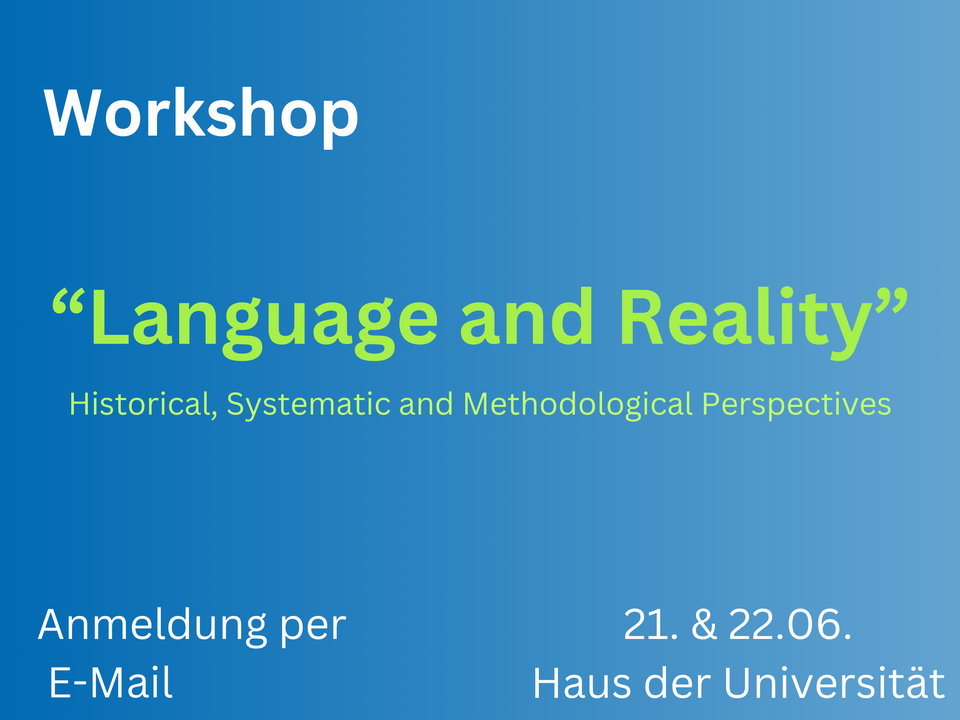About:
"The relationship between language and reality is a controversial topic at the interface of philosophy of language, epistemology, metaphysics and metaphilosophy. In philosophy of language, it touches on the question of how linguistic expressions and concepts acquire their meaning. In metaphysics and epistemology, it underlies the ongoing dispute about whether there is a reality independent of language and thought and, if so, how we can know about it. The traditional assumption is that language is a picture or representation of reality: Aristotle and later Aquinas, for example, held that the things we conceive of are ontologically independent of our conceptions of them. At the same time, they assumed an isomorphism between our concepts and the realities they represent, like between a signet ring and its imprint in a piece of wax, which makes our cognitive access to the former an epistemic access to the latter. This classical idea contrasts with philosophical views according to which what we call reality is only constructed – entirely or partly – through our speech and thought acts, or at least can only be recognized to the extent that it appears to us in our linguistic and mental representations. Thus Descartes, although he too spoke of our concepts as images of things, claimed that what the mind immediately knows when it imagines a particular thing is not the actual thing, but a mental surrogate that potentially screens off the mind from the realities ‘behind’ it; he thus became responsible for a sustained skepticism among philosophers about the knowability of the external world. Later authors such as Kant and Wittgenstein emphasized above all the active role that epistemic subjects play in the acquisition of their concepts. In their view, having concepts is not (only) a matter of being causally affected by external things, but rather a matter of adopting a certain attitude towards these things and treating them (intellectually or practically) in a particular way. So, it is ultimately us who draw the picture that is our language, not reality. An underlying assumption in all these different reconstructions of the language-reality relationship, however, is that language is the vehicle of knowledge – knowledge either of the world as it really is or of the world as we have constructed it. Thus, the dispute about the nature and origin of linguistic meaning also sets the stage for the metaphilosophical debate about the scope of our (philosophical) knowledge and the contribution of conceptual analysis, conceptual engineering and other methods, to advancing philosophical theorizing.
In recent times, however, more and more attempts have been made to tackle the language-reality problem at its very premises. On the one side, philosophical movements such as pragmatism and process ontology have attempted to overcome the old bifurcated subject-object dualism on which the whole problem rests. On the other side, authors as diverse as Gilbert Ryle, Maurice Merleau-Ponty and Michael Polanyi have questioned the assumption that knowledge must always be articulated linguistically. Interestingly, both approaches, which find echoes in modern psychological theories of embodied cognition and tacit knowledge, often go hand in hand (as in the case of Merleau-Ponty, for example) and seem to reinforce each other. So far, however, there is no consensus among the discussants as to whether such proposals really succeed in undermining the language-reality problem, or whether they do not rather succumb to the same aporias in one way or another.
Bringing together scholars from a variety of philosophical backgrounds, this workshop intends to examine the historical, systematic and methodological dimensions of the question about the language-reality nexus. Special focus will be placed on views that challenge the fundamental presuppositions of the language-reality problem as it is traditionally discussed and on the implications of these views for philosophical ambitions to access the world by way of linguistic and conceptual inquiry."
Der Workshop ist frei besuchbar, um vorige Anmeldung wird allerdings geboten.
Weitere Infos zum Workshop finden Sie hier. Anmelden können Sie sich per E-Mail an: frauke.albersmeier(at)hhu.de .


